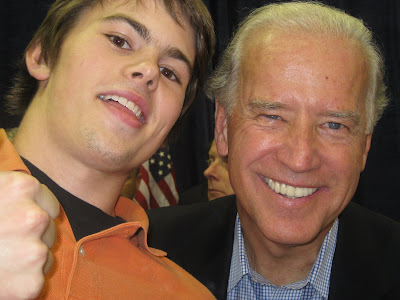First of all, I do not know what will happen if Barack Obama becomes the next President of the United States. I do not know what his agenda will become, and I cannot tell you how his administration will unfold. As I wait for the impending day of final decision, the anticipation is incredible--the butterflies are swarming. How will the next President be able to set a new course for America? Renew the economy. Improve our moral standing in the world. Ensure domestic and human rights. Civil Liberties and safety. Inspiration and hope. The American Dream.
The American people have a mountain to climb as we attempt to find our place in this 21st Century. We must come to accept the fact that we will not forever be the global superpower. Concessions will have to be made. The world is getting smaller, and we must adjust. How will will rally to convert our carbon-based economy into a renewable green one? How will we bring a hault to U.S. aggression in foreign lands? And how can we make these changes while still maintaining our strength as a nation?
It is clear to most that a new direction is necessary. I cannot promise that Barack Obama is the one, but I will attempt to put this into somewhat of a historical perspective. People keep saying that "this election is the most important election of any of our lives." Is this true? Perhaps it is. I tend to believe it is. The costs have never been higher. The economic crisis, the climate crisis, and the foreign policy crisis have come together to create a desperate climate. But as the great leaders of the past have told us time and time again during desperate times: fear not. And the man telling us to have courage happens to be a skinny black man named Barack Obama.
On November 4, 2008, the American people will make the decision, and will determine the next chapter in the Amercan Legacy. People will look back on that date as a turning point--for better or for worse. I ask you all to consider: who is the man most likely to take us safely into the future? What side of history will you be on when this is all over and done with?
Americans are a conservative people, in general. By this I do not characterize a political persuasion, but more of an unwillingness to change unless change is truly necessary. 92% of the American people believe the country is on the wrong track. Ron Paul ran on the platform of the "anti-Empire" and sparked a Revolution. People are angry and ashamed. They know we have gone off-course. We have the desire. We have the drive. The candidate we need may be in front of our very eyes.

Now we must take the leap of faith.



 that people turn to "guns and religion" largely due to economic woes--after all, religion is the "opiate of the masses." But Obama was slammed for the remark, and was portrayed as someone who worships his own superiority and wisdom, and looks down on the common man.
that people turn to "guns and religion" largely due to economic woes--after all, religion is the "opiate of the masses." But Obama was slammed for the remark, and was portrayed as someone who worships his own superiority and wisdom, and looks down on the common man.

